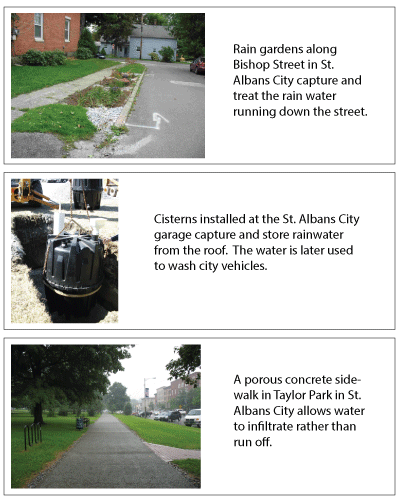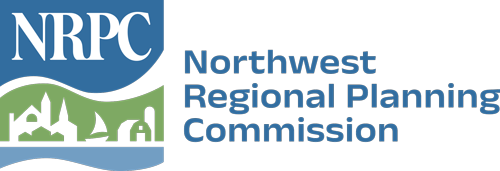As Northwestern Vermont becomes increasingly developed, be it in our village centers or rural countryside, management of stormwater becomes an important consideration for the health of our waterways. Stormwater runoff has been identified as the primary source of impairment within the Stevens and Rugg Watersheds in St. Albans.
In 2003, the NRPC worked with St. Albans City and Town and other partners to develop the Stevens and Rugg Brook Watershed Report. The NRPC has since worked to implement the recommendations of this plan with grant funds from the US EPA, Vermont DEC and other sources. In addition to traditional stormwater management practices, the NRPC has also worked to develop projects demonstrating the potential for Green Infrastructure to be retrofitted into the existing urban environment. Green Stormwater Infrastructure techniques such as roadside rain gardens and porous concrete help to mimic natural hydrology and create an opportunity to infiltrate the water back into the ground to recharge the water table. Other practices like cisterns collect rainwater during storms, which in turn reduces the volume of water headed to the stormdrain and stores it for future use.
Northwest Regional Planning Commission will be hosting an information session on the Vermont Three-Acre Permit and its implications for property owners. The information session will take place at the St. Albans Town Office (398 Georgia Shore Rd, St. Albans Bay) starting at 7 PM on September 30, 2024. For more information on Vermont’s Three-Acre Permit click here.
Green Infrastructure Toolkit
Green Infrastructure describes a set of practices and design principles that uses natural processes to manage the effects of urbanization on water. To learn more about how to combat the problems caused by urban, suburban and rural stormwater runoff, explore the Green Infrastructure Toolkit and find out how you can promote the adoption of Green Infrastructure policies and practices. To learn more click here.
Stormwater Master Planning
A Town-wide Stormwater Management Plan is a comprehensive approach that is responsive to existing landscape characteristics, connecting land use, stormwater management, floodplain management, river management, and public infrastructure needs to more effectively address all of the issues which contribute to water quality impairment or improvement.
 Stormwater Management Planning results in the following actions:
Stormwater Management Planning results in the following actions:
- Collates information from existing plans and datasets into a single, town-specific resource to guide future stormwater management activities.
- Identifies stormwater-related areas of active erosion or other sources of sediment that are being delivered directly to water bodies in the Town.
- Develops recommendations for actions that will address stormwater problems, including:
-
- A prioritized list of problem areas that can assist stakeholders in directing resources to high priority projects,
- Conceptual solutions for high-priority problem areas, and
- Potential revisions to town ordinances needed to encourage location-specific management activities.
- Also provides helps to improve coordination and increase opportunities for collaboration in meeting watershed related needs with adjacent municipalities.
More information is available here.
Outreach and Education
The Franklin County Stormwater collaborative was formed in 2014 by the City and Town of St. Albans and the Northwest Regional Planning Commission to educate and encourage residents to get personally involved in reducing stormwater pollution. This effort is conducted as part of the public education and outreach measures required by Federal Environmental Protection Agency storm water system permits. To learn more about stormwater events in St. Albans visit www.fcsvt.org.
